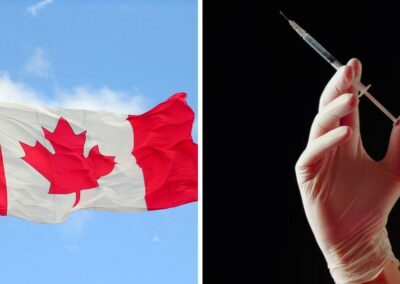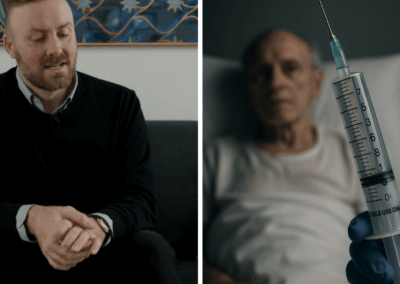A Canadian man had to wait weeks for treatment he never received so he decided to end his life by euthanasia, which was granted just two days after his request.
Dan Quayle, 52, was initially diagnosed with Stage 4 oesophageal cancer after an imaging scan in July 2023. He was hospitalised in September and waited 10 weeks at Victoria’s Royal Jubilee Hospital for chemotherapy to be scheduled. Doctors assured him that this intervention had the potential to extend his life by a year, but Quayle was never informed when treatment might begin.
“There was never a timeline on that”, said Quayle’s stepdaughter, Shayleen Griffiths. “Their exact words were, ‘We’re backlogged’”.
After weeks without treatment being scheduled, Quayle decided to end his life.
Quayle’s condition deteriorated and with no timeline for when he might receive the potentially life-sustaining chemotherapy, he decided to end his life by euthanasia.
Quayle’s wife, Kathleen Carmichael, reported that Quayle had said on 22 November “I just can’t do it anymore”. He requested euthanasia, and the life-ending drugs were administered just two days later.
His family were hoping that he would change his mind or that they might receive a call at the last moment that the chemotherapy had been scheduled.
His wife said “I think I could still have my Dan if he had gotten treatment sooner”.
Quayle’s wife said of his prolonged wait for treatment “If we had more money, we could have gone to the States. But we’re just regular people”.
Other recent cases have highlighted that euthanasia can be easier to access than health treatment in Canada.
The delays Quayle experienced, which appear to have at least partially motivated his decision to end his life by euthanasia, have been experienced by others in Canada. The National Post reported on two women from Vancouver Island who shared their experiences of traveling to the United States for cancer treatment after experiencing barriers to treatment in Canada.
Kristin Logan was able to receive treatment for her cancer in Washington State due to her status as a dual citizen and former US Air Force veteran. Allison Ducluzeau, a real estate agent, was able to raise money and contribute from her own inheritance to pay $153,000 (US dollars) for surgery in the USA.
Earlier this year, The Telegraph published a ‘Letter to the Editor’ in which a reader from Canada outlined that a family member had to wait a year for a psychiatric appointment but that it was possible to make an appointment for euthanasia in two weeks. At the end of 2022, it was found that as many as five Canadian veterans had been offered assisted suicide or euthanasia instead of the care they actually wanted and needed. According to recent data published by Statistica, the median waiting time from a specialist appointment to treatment in Canada in 2022 was 14.8 weeks, while the average waiting time from a GP referral to treatment was 27.4 weeks.
The number of Medical Assistance in Dying cases in Canada has been steadily growing each year
In 2022, a total of 13,241 people ended their lives by euthanasia or assisted suicide, an increase of 31.2% from the previous year, accounting for 4.1% of all deaths in Canada.
According to the annual report from Health Canada, 86.3% of individuals requesting assisted suicide or euthanasia cited “the loss of ability to engage in meaningful activities” and 81.9% cited the “loss of ability to perform activities of daily living” among their reasons for wanting to die.
17.1% cited loneliness as their reason for wanting to end their lives, while 35.3% were concerned about being a “burden on family, friends or caregivers”.
At a recent parliamentary event, Alex Schadenberg, Executive Director of the Euthanasia Prevention Coalition in Canada, told parliamentarians how the Canadian euthanasia law had expanded to include people who were not terminally ill, and how the law in Canada will soon permit euthanasia on the basis of mental illness alone. Contrary to the idea that euthanasia is a rational choice for those suffering and near death, he explained that “most people die by euthanasia because they are going through a difficult health condition, and they are feeling depressed, lonely or experiencing feelings of hopelessness and they believe that their life has no purpose”.
Spokesperson for Right To Life UK, Catherine Robinson, said “It is awful to hear of this tragic case of a man who waited ten weeks without receiving life-saving cancer treatment, but was able to end his life by euthanasia within two days of making a request”.
“In an incredibly Orwellian move, the Canadian newspaper, The National Post, which reported on this sad story, said that Quayle had “died of [o]esophageal cancer”, rather than saying he had died via euthanasia”.
“The number of dire situations we are hearing about in Canada should be a clear warning to the UK and other countries considering making euthanasia and assisted suicide legal”.












